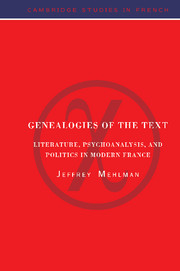Book contents
- Frontmatter
- Contents
- Acknowledgments
- 1 Introduction
- 2 Craniometry and criticism: notes on a Valéryan criss-cross
- 3 Literature and hospitality: Klossowski's Hamann
- 4 Literature and collaboration: Benoist-Méchin's return to Proust
- 5 “Pierre Menard, author of Don Quixote” again
- 6 Iphigenia 38: deconstruction, history, and the case of L'Arrêt de mort
- 7 Writing and deference: the politics of literary adulation
- 8 Perspectives: on Paul de Man and Le Soir
- 9 Prosopopeia revisited
- 10 The paranoid style in French prose: Lacan with Léon Bloy
- 11 The Holocaust comedies of “Emile Ajar”
- 12 Pour Sainte-Beuve: Maurice Blanchot, 10 March 1942
- 13 Flowers of evil: Paul Morand, the Collaboration, and literary history
- Appendix
- Notes
- Index
- Series list
8 - Perspectives: on Paul de Man and Le Soir
Published online by Cambridge University Press: 19 January 2010
- Frontmatter
- Contents
- Acknowledgments
- 1 Introduction
- 2 Craniometry and criticism: notes on a Valéryan criss-cross
- 3 Literature and hospitality: Klossowski's Hamann
- 4 Literature and collaboration: Benoist-Méchin's return to Proust
- 5 “Pierre Menard, author of Don Quixote” again
- 6 Iphigenia 38: deconstruction, history, and the case of L'Arrêt de mort
- 7 Writing and deference: the politics of literary adulation
- 8 Perspectives: on Paul de Man and Le Soir
- 9 Prosopopeia revisited
- 10 The paranoid style in French prose: Lacan with Léon Bloy
- 11 The Holocaust comedies of “Emile Ajar”
- 12 Pour Sainte-Beuve: Maurice Blanchot, 10 March 1942
- 13 Flowers of evil: Paul Morand, the Collaboration, and literary history
- Appendix
- Notes
- Index
- Series list
Summary
Some years ago, in a text of homage to Derrida, Emmanuel Levinas, without malice but with a touch of the unwitting resentment that only the deconstructed perhaps harbor, proposed the oddest of analogies. The historical sequence he was invariably reminded of upon reading Derrida, he wrote, was the “exodus” of 1940: “L'unité militaire en retraite arrive dans une localité qui ne se doute encore de rien, où les cafés sont ouverts, où les dames sont aux ‘Nouveautés pour dames,’ où les coiffeurs coiffent, les boulangers boulangent, les vicomtes rencontrent d'autres vicomtes et se racontent des histoires de vicomtes, et où tout est déconstruit et désolé une heure après.” Such would be the frisson nouveau introduced by Derrida: a traumatic rendering of the traditional sites of thought so “uninhabitable” that the principal shock it evokes out of Levinas' memory is the evacuation of town after town in anticipation of Hitler's surge westward. Ortwin de Graef s discovery of the numerous articles published by Paul de Man in Le Soir during the first half of World War II is perhaps first of all an invitation to imagine Levinas' improbable metaphor as metonymy, his analogy as sequence. For de Man, it now appears, served, in the course of his life, as champion of two radical cultural movements from abroad: as partisan of the Nazi “revolution” among the Walloons in the 1940s and as advocate of “deconstruction” among the Americans in the 1970s. Hitler's jolt to European sensibilities – too devastatingly rapid, as de Man repeatedly suggests in Le Soir, to have registered in psychological terms – and Derrida's, that is, are less the stuff of grotesque analogy (Levinas) than nodes of a complex continuum one name of which may be the “life of Paul de Man.”
- Type
- Chapter
- Information
- Genealogies of the TextLiterature, Psychoanalysis, and Politics in Modern France, pp. 113 - 130Publisher: Cambridge University PressPrint publication year: 1995



